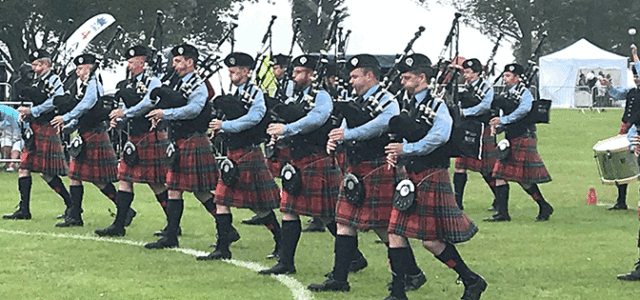
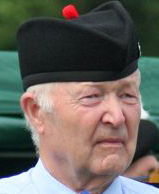
Since my last posting on Piping Press, in addition to a number of local competitions across the country, there have been two RSPBA Major Championships – the European Championships at Forres on 30 June and the Scottish Championships at Dumbarton on 28 July.
The European Pipe Band Championships have had a history of travelling around the country as well as beyond the UK. This Championship was introduced by the then SPBA on 18 June 1949 when the venue was Dundee. More recently over the past 16 years (including 2018) the Championships have been held in Belgium, Lisburn (twice), Banbridge, Greenock, Inverness, Inverclyde, Belfast (three times) and Forres (six times).
The Belgium venue in 2003 was Alden Biesen Castle near Bilzen in the province of Limburg; and it was the only occasion an RSPBA Major Pipe Band Championships has been held outwith the UK. For many years Alden Biesen Castle has also been the venue for the annual Scottish Weekend which incorporates the Pipe Band Championship Belgium. The event has gradually increased in profile as an international music festival with a strong Scottish and traditional music flavour. In 2003 the annual event followed the day after the European Championships so that the pipe bands which managed to stay over had the opportunity of a double competition.
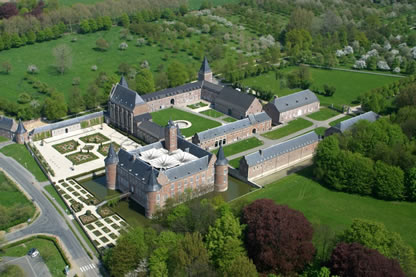
The statistics for the Grade 1 winners of the European Championships over the past 16 years (including 2018) follow a similar pattern to the earlier two Major Championships this year. During that period the Europeans have been won eight times by Field Marshal Montgomery, three times by Inveraray and District, twice by both Boghall & Bathgate Caledonia and St Laurence O’Toole, and once by Strathclyde Police. This year the Grade 1 honours went to Inveraray and District, winning their first Championships of the year, having taken second place at the British and UK Championships. Field Marshal Montgomery rose to second place with Scottish Power third and St Laurence O’Toole fourth.
Hard on their heels, however, were Police Scotland Fife with their second 5th placing of the year. In Grade 2 first place again went to Mackenzie Caledonian with Closkelt, their early season rivals from Northern Ireland unfortunately being absent. Uddingston Strathclyde took the honours in Grade 3A ahead of previous winners Royal Burgh of Annan. Johnstone took first place in Grade 3B with previous winner St Marys, Derrytrasna absent this time. In Juvenile Dollar Academy reversed the UK Championships result by winning ahead of George Watson’s College. Tweedvale won Grade 4A, improving from sixth place at the British Championships. Lower Clyde took first in Grade 4B ahead of Mid Argyll, reversing the result at the British Championships. Dollar Academy maintained their winning run in Novice Juvenile A at the first three Major Championships. North Lanarkshire Schools took first in Novice Juvenile B as they did at the British Championships. Overall there was also a significant improvement in the consistency of results between adjudicators, which was good to see.
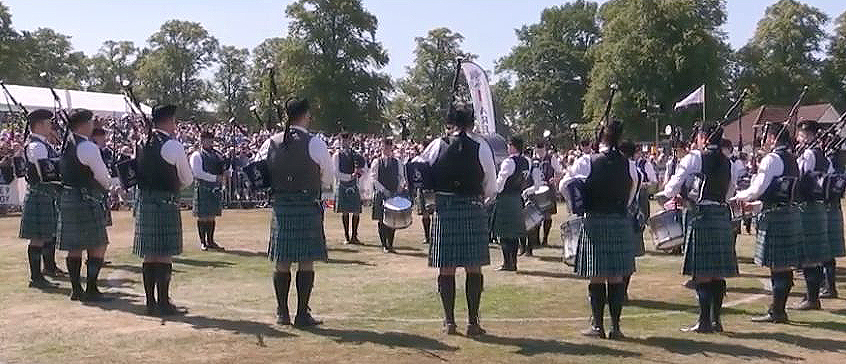
Between the European and Scottish Championships the All-Ireland Championships took place in New Ross, Co Wexford on 7 July (which have already been reported on in Piping Press) as well as local competitions at Annan, Glenarm (Northern Ireland), Corby, Burntisland and Newcastle (Northern Ireland). Band entries at the majority of these, apart from the All-Ireland, was again low, July being the holiday season perhaps an additional factor. Burntisland did, however, manage to attract one Grade 1 pipe band in the form of Police Scotland Fife. It is also interesting to note that Field Marshal Montgomery took the honours in Grade 1 at the All-Ireland ahead of St Laurence O’Toole, maintaining their dominance of that competition since 1989 apart from on four occasions when they came second.
The first SPBA Scottish Pipe Band Championships were held in Blairgowrie on 12 June 1948. As I have mentioned previously on Piping Press, the venue during the 1960s and 1970s was Princes Street Gardens in Edinburgh, but since that time Scotland’s capital city unfortunately has not hosted any of the Major Championships. During the past 19 years the venue for the Scottish has been Levengrove Park in Dumbarton, organised by the local council in conjunction with the RSPBA. Perhaps not surprisingly the Grade 1 competition has again been dominated by the same bands. Over the past 16 years Field Marshal Montgomery have won on 10 occasions, St Laurence O’Toole on three (including 2018), Inveraray on two and Strathclyde Police once.
I was able to attend these Championships and unfortunately the extremely warm weather we have been experiencing recently chose to break the night before and Dumbarton encountered a mixture of light rain, heavy rain, a strong wind at times, a very limited amount of sun and a temperature much lower than the day before. The event went smoothly from an RSPBA organisational perspective but the varying weather conditions must have presented a major challenge for the bands in tuning their instruments. As always I met many people I have not seen for some time. One of these was former RSPBA adjudicator colleague, Linden (Dixie) Ingram, who just before I met him had received his formal presentation in recognition of his retirement from the RSPBA panel at the end of 2017. No longer an adjudicator, the ever active Dixie then later appeared in the front rank of the Pipes and Drums Scots Guards Association (South) Pipe Band which took fourth place in the Grade 3B competition (see picture below).
Later in the day I was also delighted to meet Steven Stanley, who is in Scotland as Director of the Brisbane Boys’ College Pipe Band from Australia. The College had bands competing in Novice Juvenile A and B at the Scottish Championships, taking 4th and 5th places respectively. They are over to play in this year’s Royal Edinburgh Military Tattoo and are taking in a number of competitions when they can. Originally from Penicuik, I taught Stevie as a snare drummer as a youngster in the West Linton & District Pipe Band many years ago. At that time he also added competing as a Drum Major to his skillset. He later played in Lothian & Borders Police Pipe Band before emigrating to Australia, where for a time he also played with the Queensland Police Pipe Band under Pipe Major David Barnes.
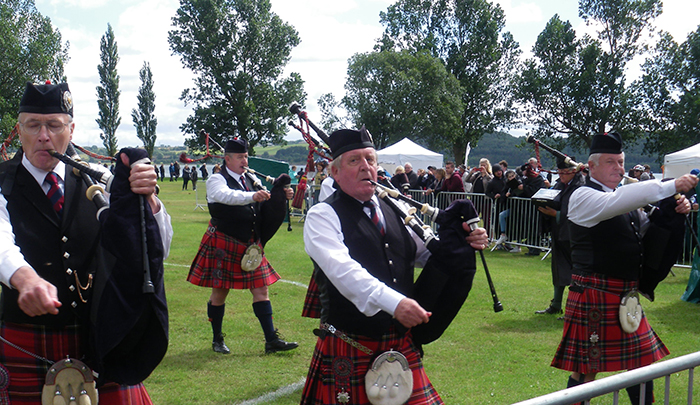
One of the downsides of a Major Championships is that it is impossible to listen to all the grades as there are usually four separate competitions running at the same time. I did manage to listen to all the bands in the Novice Juvenile A competition. Although placed only 5th overall, I was particularly impressed with the Peoples Ford Boghall & Bathgate Pipe Band in this grade, as were others standing beside me. Although fairly small in numbers with some tiny players, this band was an excellent example of balanced sound between pipes and drums, rhythmic and musical playing, and smartness in marching and deportment. The Boghall & Bathgate system of teaching has an unsurpassed record of nurturing youngsters through the grades and maintaining their interest until they are capable of progressing to the Grade 1 band.
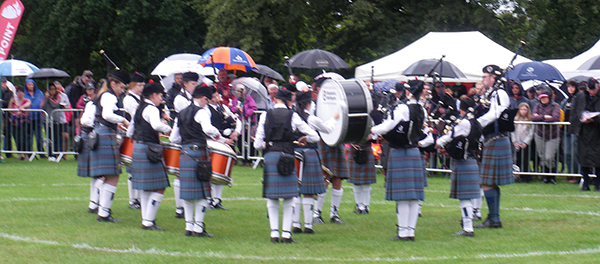
I was also able to listen to all the Grade 1 performances, some of which were badly affected by the weather. I felt particularly sorry for Shotts & Dykehead Caledonia who experienced a serious ‘drooking’. Despite that the band maintained its performance well throughout with a good sound balance and a sweet piping sound, a performance which I thought deserved a top six finish. From where I was standing I did not think the drum corps deserved the lowly placing of 11th. The weather also hit Field Marshal Montgomery badly for a large part of their performance and the heavy deluge during the Shotts performance must also have affected FMM’s final tuning. Despite that the band (pictured top) still produced a strong performance well capable of winning the competition. In better weather conditions and last to play, the equally strong performance from St Laurence O’Toole obviously was preferred by the adjudicators for first place. Inveraray and District also played very well but I thought at times the eleven snare drummers were rather dominant, which impacted on the band’s overall sound balance from where I was standing.
Other potential top six bands for me were:
- Peoples Ford Boghall & Bathgate Caledonia, the band I thought had the best overall sound balance between pipes and drums in terms of a pitch pleasant to the ear as well as sound clarity. It is difficult to fathom where the 12th placing for piping from one adjudicator came from.
- Scottish Power, who maintained their strong season to date. Their march and strathspey I thought were a little too controlled but that was more than offset by their lively and musical reel.
- Police Scotland Fife, another strong and musical performance which perhaps at times verged on being too lively. With these tempos the drummers came through rather dominant and intense, in the reel particularly.
In other grades the results varied more than from the earlier Championships this year. In Grade 2, Closkelt and Mackenzie Caledonian were further down the pecking order with 3rd and 7th places respectively, both hit heavily for drumming despite being in the top four for ensemble. In Grade 3A Uddingston Strathclyde and Royal Burgh of Annan maintained their 1st and 2nd places from Forres. Grade 3B had a new winner in Scottish Borders. The Juvenile grade again went to Dollar Academy ahead of George Watson’s College. Lochryan took first place in 4A and Bessbrook Crimson Arrow from Northern Ireland won 4B despite a lowly 9th place for drumming. Dollar Academy have now won Novice Juvenile A at all four Championships to date and North Lanarkshire Schools comprehensively topped Novice Juvenile B with 1st place from all four adjudicators.
In general all the bands and adjudicators are to be commended for how they coped with the conditions on the day. On now to the World Championships in less thana fortnight’s time. Clearly the top award is still wide open this year and it is a certainty that in all grades bands from other countries will be in the mix. Let’s hope that the weather is much better than Dumbarton!
[wds id=”2″]



















